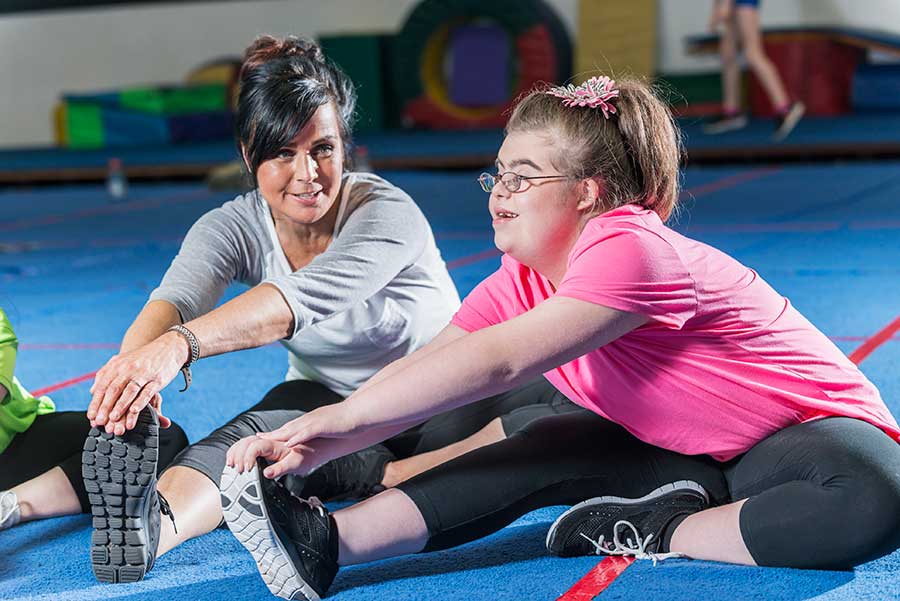I am that person who starts preparing for what’s ahead way before the rest of the general population. My oldest child, Amanda, has Down syndrome, type 1 diabetes and celiac disease. When Amanda, who is now 21, was still in middle school, I began looking to see what was available when we left the world of school-supported services. Options have changed significantly since I began my search.
To put together a self-directed plan that suited Amanda, I relied on information and services from Advocates Incorporated, an agency that helps people with developmental disabilities and their families. (Some of the information in this column was taken from Advocates’ site.) Self-direction allows families to plan and manage life for their adult child with special needs after school district-supported services have concluded.
The benefits to this model are that the supported adult’s program is directed by their interests and chosen activities. The challenge for families and caregivers is that you become primarily responsible for all coordination and management of that plan on a daily basis.
If done successfully, self-direction can provide a lifestyle that is meaningful and productive for an adult with special needs. A key to the success of self-direction are the mentors you choose and the activities you plan.
A mentor helps the adult with special needs meet goals she has set. The mentor also communicates with the person and other members of the support team, including parents or caregivers. A mentor can also support the individual at home, on the job, and in the community.
When your child is still in school, the match with the teaching assistant working directly with him or her can determine how well the year goes. The same is true of the mentors you hire: How well they work with your adult and others is a significant factor in meeting everyone’s needs.
Amanda has a definite interaction style that works best for her. We learned this through trial and error during her school career. She responds best to people who are fun but firm, people who can change strategy on the fly and creatively redirect.
Heaven forbid Amanda senses she can get the upper hand and gain control. She can figure this out in the first moments of the relationship, and the pattern can take a long time to correct. It is critical that anyone working with her develop a way to let Amanda think she is in charge without her totally being so. Head-on confrontation never works—a fact I myself tend to forget when I am frustrated.
“A key to the success of self-direction are the mentors you choose and the activities you plan.” — Deborah Cavanagh
Another factor: A busy Amanda is a happy Amanda. When she was in school, seven-plus hours of her day were filled without much effort on my part. I was responsible for evenings and weekends, but that was relatively easy. I knew I had to keep her active and engaged in her community. I did not want everything she did centered on eating and socializing.
I began coordinating activities during her junior year in high school. Amanda started volunteering at three different nonprofits close to our home. These were jobs we hoped to keep after she graduated. We also hired two mentors to begin working with Amanda while she was still a student. One was specifically hired to do “fun things” on Friday nights with friends. The other picked her up from school and was in charge of physical fitness activities, which reflected valued outcomes within her plan.
It became apparent that pairing activities with mentors worked well for Amanda. She enjoyed the variety and it made sense in her brain, and mine too. As we added endeavors we matched mentors that fit.
I started scouting potential mentor hires even before our self-direction plan was approved. I considered family members and friends in the area; retired teachers; teaching assistants who worked in our school district; college students looking for a little extra money, who had connections to the special needs community; and siblings of Amanda’s friends with special needs, who totally “got it.” Almost anyone was a potential mentor.
The agency you are working with will assign you to a support broker who can line up interviews with prospective mentors who work for their agency. (More information on this topic can be found at the website of the state Office for People with Developmental Disabilities.) A support broker helps you and your individual exercise as much choice and control over their life as possible. They guide individuals through initiation of a self-directed budget and provide ongoing support. You can encourage friends and family members to apply and then become eligible.
We have found that working with mentors of various ages has worked best. Amanda has a couple of mentors who are college aged, a mentor in her 20s, two who are middle aged and a few a bit beyond that range. They each bring different skills to the table, given their personalities and life experiences.
A benefit of having multiple mentors throughout the week is that if one has a scheduling challenge such as illness, car issue, vacation, or training, we have a pool of trained mentors, familiar with Amanda, who can cover.
I created a Google calendar specific to Amanda to keep everything straight and hopefully not double-book her or her mentors. I color-coordinated each mentor and then listed their names and the activities they were assigned. I listed their phone numbers so each mentor could reach out to others if needed. There were days and times when Amanda was going directly from one mentor activity to another and the dropoff and pickup was out in the community. The mentors needed to connect.
This system took trust. Amanda went from being in one place with the same set of people her whole day in school, to bopping around the greater Syracuse area with a variety of people.
Amanda and I both need to feel comfortable with the people she works with. Amanda gives input regarding the mentors we choose. If we are hiring someone we are not familiar with, I have Amanda interview the individual along with myself and our support broker. I do this after I have already pre-interviewed the person to determine if I think they may work out.
During the interview, it is important to see how the candidate interacts with Amanda. Do they make eye contact with her? Do they direct questions to her or to me or the support broker? Do they ask her relevant questions? Do they look comfortable given the situation? How does Amanda respond to them? Plus, it gives me a second time to meet with them and ask any questions I may have forgotten in the initial interview.
When it comes down to it, you are the employer. If, given time and effort, the mentor does not work out, you may need to look in another direction. It is important for the adult you are supporting that their plan be successful. Having mentors who fit their activities, personality and lifestyle is crucial.
Planning and creativity ahead of time can make the transition from high school student to active and fulfilled adult life a relatively smooth one. Isn’t that a goal we have for all our children?
Deborah Cavanagh lives in Manlius with her husband and two children. She has written for local organizations supporting children and adults with special needs.





